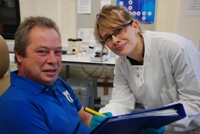Diabetes information evening

Diabetes researcher Ffion Curtis with Ronnie Maher, who is taking part in a study into Vitamin D deficiency and diabetes.
13 June 2012
3.8 million people are currently living with diabetes in the UK, a figure that is projected to increase to 6.25 and cost £16.9 billion to the NHS (17% of its annual budget) by the year 2035.
Working alongside the Bronglais Hospital Diabetes Specialist Team, the Department of Sport and Exercise Science at Aberystwyth University is hosting A Diabetes Information Evening.
The event, which takes place at 7pm on Wednesday the 13th of June, forms part of Diabetes Week (12-16th of June) and is designed to raise awareness about diabetes and provide support for those who already have the condition.
More than 160,000 people in Wales have been diagnosed with diabetes which is nearly 5% of the population. On top of that it’s estimated that there are 66,000 more people that have the condition but have not yet been diagnosed.
In people with diabetes the body cannot make proper use of the glucose in the blood. This means the glucose cannot be used effectively as a fuel, and results in high blood glucose values.
Type 1 diabetes is treated with daily insulin injections. Type 2 accounting for between 85%, and 95% of all diabetes cases is treated by medication and/or insulin. The recommended treatment for all diabetes includes a healthy diet and regular physical activity.
The evening’s organiser Ffion Curtis, who is researching the effects of vitamin D deficiency on diabetes said: “One of the primary reasons we are seeing an increase in the number of cases of diabetes is because of our changing lifestyles.”
“Our diets have changed and we are much less physically active than we used to be, spending more time sitting in our cars, and in front of computer screens. We are now also seeing an increase in the number of children that are developing type 2 diabetes. If not properly managed and treated, diabetes can lead to many complications including heart disease and strokes.”
“There are however, many small changes we can make to our lives, and the lives of our families that can help reduce the risk of developing diabetes, and help in the management of the condition.”
Working alongside the NHS, the Department of Sport and Exercise has several ongoing research studies exploring some of the different risk factors associated with diabetes.
The evening is an opportunity for people with an interest in diabetes research to come and have a look around the Departments laboratories.
There will be the opportunity to look around the state of the art laboratories in the department. On hand to answer any questions will be members of the research team, the diabetic specialist team from Bronglais hospital, members of the Machynlleth Diabetes UK Support Group, and a representative from Diabetes UK.
A warm welcome (with tea and coffee) is extended to all who would like to come along to find out more about diabetes, and research into diabetes. If you would like to attend or would like some more information about the event, please contact Ffion Curtis by phone; 01970 622070, or by email; fic7@aber.ac.uk.
AU18712



